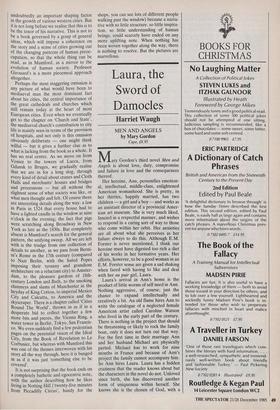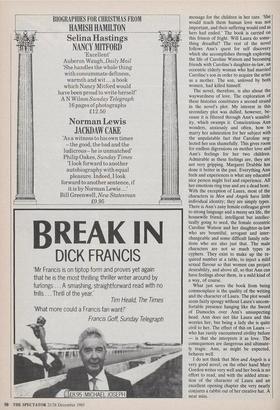Laura, the Sword of Damocles
Harriet Waugh
MEN AND ANGELS by Mary Gordon Cape, f8.95 Mary Gordon's third novel Men and Angels is about love, duty, compromise and failure in love and the consequences thereof.
Her heroine, Ann, personifies emotion- al, intellectual, middle-class, enlightened American womanhood. She is pretty, in her thirties, happily married, has two children — a girl and a boy — and works as an assistant director of a provincial Amer- ican art museum. She is very much liked, fancied in a respectful manner, and wishes to respond in a caring sort of way to those who come within her orbit. Her anxieties are all about what she perceives as her failure always to do this. Although E.M. Forster is never mentioned, I think our heroine must have digested too rich a diet of his works in her formative years. Her efforts, however, to be a good woman in an E.M. Forster sense are given a sad shaking when faced with having to like and deal with her au pair girl, Laura. Laura's arrival in Ann's home is the product of little worms of self need in Ann. Nothing aggressive, of course; just the chance to expand intellectually and creatively a bit. An old flame hires Ann to write the catalogue of a neglected female American artist called Caroline Watson who lived in the early part of the century. There is nothing in the project that should be threatening or likely to rock the family boat, only it does not turn out that way. For the first time in their marriage Ann and her husband Michael are physically parted. Michael has to work for nine months in France and because of Ann's project the family cannot accompany him. So Ann hires Laura. Laura has a hidden craziness that the reader knows about but the characters in the novel do not. Unloved since birth, she has discovered another form of uniqueness within herself. She knows she is the chosen of God, with a message for the children in her care. 'She would teach them human love was not important, and their suffering would end as hers had ended.' The book is carried on this frisson of fright. Will Laura do some- thing dreadful? The rest of the novel follows Ann's quest for self discovery which she accomplishes through exploring the life of Caroline Watson and becoming friends with Caroline's daughter-in-law, an eccentric elderly woman who had married Caroline's son in order to acquire the artist as a mother. The son, unloved by both women, had killed himself.
The novel, therefore, is also about the waywardness of love. The exploration of these histories constitutes a second strand in the novel's plot. My interest in this secondary plot was dulled, however, be- cause it is filtered through Ann's sensibil- ity, which swamps it. Conscientious Ann wonders, anxiously and often, how to marry her admiration for her subject with the unpalatable fact that Caroline neg- lected her son shamefully. This gives room for endless digressions on mother love and Ann's feelings for her two children. Admirable as these feelings are, they are not very gripping. Margaret Drabble has done it better in the past. Everything Ann feels and experiences is what any educated nice person might feel and experience. All her emotions ring true and are a dead bore. With the exception of Laura, most of the characters in Men and Angels have little individual identity; they are simply types. There is Ann's zany female colleague given to strong language and a messy sex life, the housewife friend, intelligent but intellec- tually going to seed, the female eccentric Caroline Watson and her daughter-in-law who are bountiful, arrogant and inter- changeable and some difficult family rela- tions who are also just that. The male characters are not so much types as cyphers. They exist to make up the re- quired number at a table, to inject a mild sexual flavour so that women can project desirability, and above all, so that Ann can have feelings about them, in a mild kind of a way, of course.
What just saves the book from being commonplace is the quality of the writing and the character of Laura. The plot would seem fairly spongy without Laura's uncom- fortable presence hanging like the Sword of Damocles over Ann's unsuspecting head. Ann does not like Laura and this worries her, but being a lady she is quite civil to her. The effect of this on Laura who has rarely encountered civility before — is that she interprets it as love. The consequences are dangerous and ultimate- ly tragic. Ann, as might be expected, behaves well.
I do not think that Men and Angels is a very good novel; on the other hand Mary Gordon writes very well and her book is no effort to read, and with the added attrac- tion of the character of Laura and an excellent opening chapter she very nearly conjures a rabbit out of her creative hat. A near miss.



















































































 Previous page
Previous page